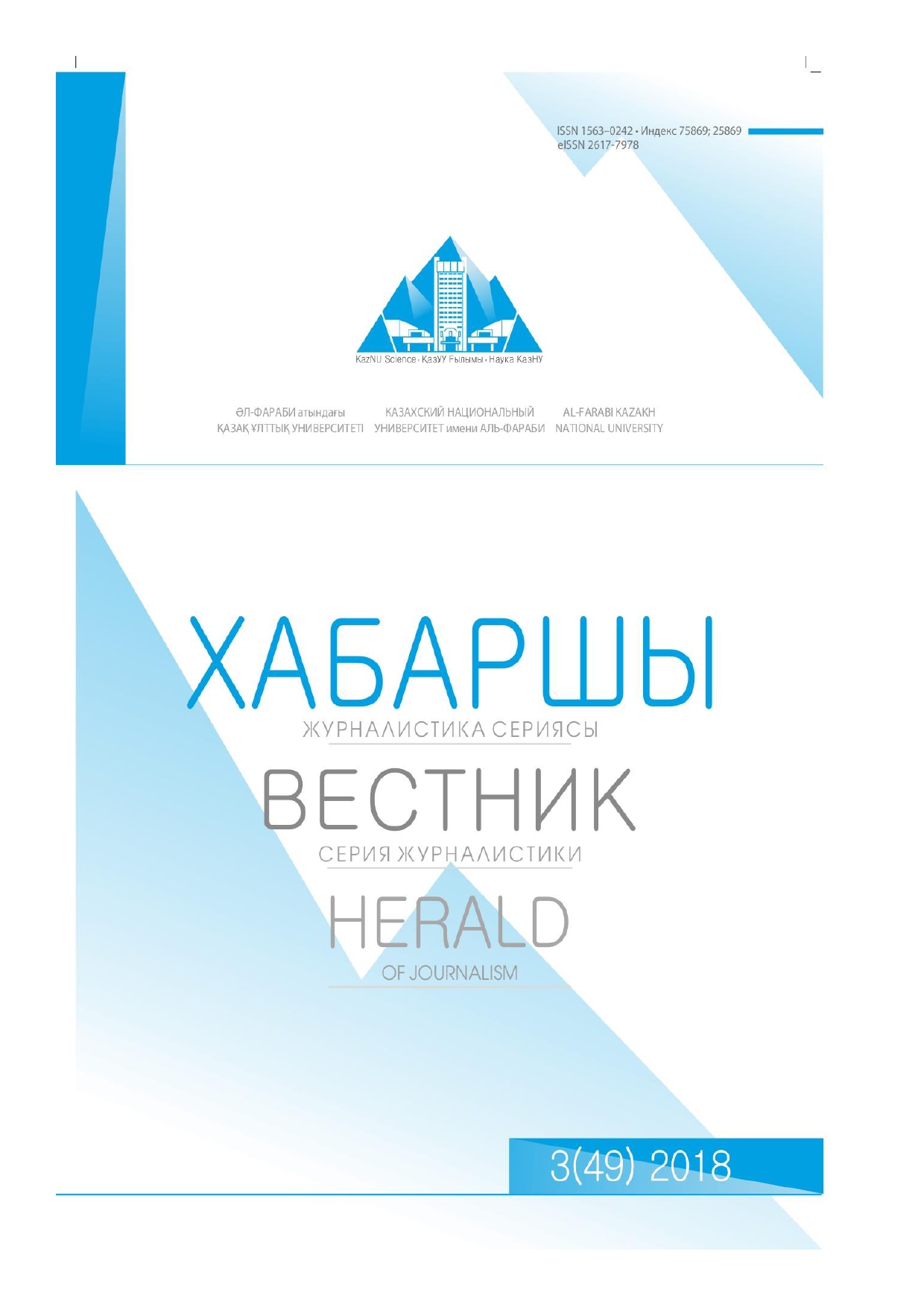Formation and development of media literacy in Kazakhstan
Keywords:
fake, fact-check, democracy, range, competence, convergence in the media industry, media literacy, drone-journalism, media hygiene, discrimination, longrida, infographic., Түйінсөздеp: фейк, фaкт-чекинг, демокрaтия, диaпaзон, компетенция, медиaиндустриядaғы конвергенция, медиaсaуaттылық, дрон-журнaлистикa, медиaгигиенa, дискриминaция, лонгридтер, инфогрaфикa.Abstract
The article highlights the concept of media literacy in the information sphere, which is one of the
most important issues to date, and provides information on the development of the media in Kazakhstan.
In the field of information, there are many facts about illiteracy, which today lead to a multitude of problems,
including interethnic conflicts. A common understanding of media and information for democracy
is described. And it also talks about media components and options for using it to efficiently and quickly
access information. How should we today be critical of information and information sources. The article
describes in detail the application of new and traditional media formats in Kazakhstan. One of the
main goals of this article is to introduce the functions of the media and other information services and
to realize their importance for developing a civilian position and making decisions taking into account
all available information. Demonstrate knowledge and understanding of various ways of using media in
personal and professional life.
References
Anderson C. Free: The Future of a Radical Price, Hyperion Books, 2009
Buckingham D. Policy Paper. [Digital source] / Youth Media Education, UNESCO Communication Development Division,
CD-ROM, Paris, 2004.
Vartanova E.JL, Zasursky Ya.N. Media education as a means of forming information security for young people / Information
and psychological security in the media. T.1. : TV and advertising communications, under the editorship of Dontsov AI, Zasursky
JN, Matveeva JI.B., Podolsky AI,. M., 2002.
Eticheskiye zhurnalistkie kodeksy stran mira http:ethicnet.uta.fi/codes by country
Internet Edition ELEPHANT. Access mode: www.slon.ru
Electronic Edition OpenSpace.ru. Access mode: www.openspace.ru
ISSN 1563-0242 Herald of journalism. №3 (49). 2018 17
eISSN 2617-7978
Mussayeva B.A., Nello Barile
Electronic media “Private Correspondent”. Access mode: www.chaskor.ru
Medyinaya I informachionnaya gramotnost’. L.Akhmetova, A.Niyazgulova, D.Sholohov, Byuro Unesco v Almaty, 2015.
Eticheskiy Kodeks zhurnalistov Kyrgystana: http//journalist.kg/codex/
Top 5 feikov Kazakhstana https://www.zakon.kz/glavnoe
Kak raspoznat’ feikoviiye novosti v internete http://www.facebook.com/DWrussian/videos
Medyinaya I informachionnaya gramotnost’ programma obucheniya pedagogov. Pod pedaktsiey Fltona Grizzla I Kerolayn
Wilson. 2012
Medyinaya I informachionnaya gramotnost’. Avtorskiy kollektiv: Layla Akhmetova, Aigul’ Niyazgulova, Dmitriy Sholohov.
Byuro Unesco v Almaty, 2015.
Lang, Kerol. Medyagramotnost’./АО IREX Moldova, 2015/Tipogr.Foxfrot SRL
Spichkin A.B. What is media education? A book for teachers. Kurgan, 1999.
Matveeva JI.B. Cultural and psychological preconditions for the phenomenon of “torn communication” in the media.2004.
Publications of the American Media Literacy Center. [Electronic resource] Center of Media literacy. Access mode: www.medilit.
org.
TV and advertising communications, under the editorship of Dontsov AI, Zasursky JN, Matveeva JI.B., Podolsky AI,. M., 2002.
The Pew Internet & American Life Project. Access: www.pewinternet.org
Why the Future of Business Is Selling Less of More, Hyperion,. Anderson C. 2008.
The phenomenon of “torn communication”, ed. Zasursky JN, Zinchenko Yu.P 2009.
Oleg Matfatov. Kriticheskoe myshlenye: bazoviye printsipi I priyemy https://newtonew.com/science/critical-thinking-quidance
On the web portal OpenSpace and the Matveeva JI.B. Cultural and psychological preconditions for the phenomenon of “torn
communication” in the media. publication of E. Salnikova in the electronic newspaper “Private Correspondent” 2004.
Jarvis J. What Would Google Do ?, Harperluxe, 2009
Mezhdunarrodniye standarty professional’noy etiki zhurnalistov http://if.spbu.ru/upload/files/file
Zhurnalistika v usloviyah konflikta http:www.osce.org/Ukraine/260646
Fedorov A.B. Media education in pedagogical universities. Taganrog, 2003.
Faktcheking: vozmozhnosti I perspektivy. Gorohovskiy A. Almaty, 2017. Zasursky Ya.N., / Information and psychological
security in the media. T.2 .: The phenomenon of “torn communication”, ed.
Zasursky JN, Zinchenko Yu.P., Matveyeva LV, Vartanova E. JL, Podolsky AI, M., 2008.













